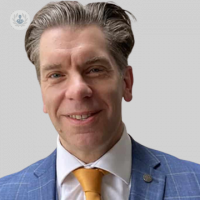Immunotherapy for allergies: What is it and is it suitable for children?
Escrito por:Dr Tom Dawson, a consultant paediatrician, explains everything you want to know about immunotherapy for allergies and discusses its suitability as treatment in children.
What is immunotherapy for allergies?
Immunotherapy for allergies encourages the immune system to recognise and respond to allergic proteins diifferently. This treatment has been around for 100 years and is used more commonly in Europe and America than in the UK.
It works to teach the immune system to make different antibodies, IgG4, to the pollen proteins instead of the allergic antibodies, IgE. The new antibodies may compete with the allergic IgE antibodies and redirect the immune system through response.
What treatments are available?
The treatment is established in sublingual (under the tongue) and subcutaneous (under the skin) preparations. These treatments are probably similarly effective.
Some sublingual preparations are licensed and can treat allergy to grass and tree pollen and house dust mite.
Other unlicensed products are available for treatment of animals or moulds. Treatment takes three years and entails taking a daily tablet or liquid under the tongue. The biggest improvement is seen in the first year and modest improvement in the second year. The treatment in the third year is to prevent further deterioration in the symptoms and research has shown no deterioration over the subsuquent five years, although this could be longer.
What allergies do immunotherapy work for?
Immunotherapy works for aeroallergens causing allergies to pollen and house dust mite as well as animals and moulds. These allergies usually cause hay-fever type symptoms such as a runny, blocked and itchy nose, itchy, red and watery eyes and sometimes tiredness and headaches.
Some people with oral symptoms with foods, typically fruits, due to pollen, may see an improvment in their symptoms too. There are also some immunotherapy treatments available for food allergy, but these need to be started in a hospital setting.
Is immunotherapy safe for children?
Yes, immunotherapy is safe for children.
There are risks for those who have severe or uncontrolled asthma and it´s not recomended for this group. Allergy to fish is also a relative contraindication so anyone suffering from a fish allergy should not undergo immunotherapy.
There is a small risk, about 1 in 1,000,000, of anaphylaxis (a severe alllergic response) although this is more commonly associate with those who have received subcutaneous (undet the skin) treatment, as opposed to sublingual (under the tongue) treatment.
Most people will have some side effects at the beginning of treatment with an itchy or tingly tongue and sometimes throat. This lasts for a few minutes and improves with the duration of treatment. These side effects are not usually reported after six weeks.
What age can you start immunotherapy?
Research has demonstrated effectiveness in patients as young as four years old, but the licensed treatments are from six or twelve years old, depending on the preparation. It may be more difficult to administer in some children under the age of six.
How long does it take for allergy immunotherapy to work?
Most children receive the biggest improvement in their hay fever symptoms during the first year of treatment. A further improvement in the second season occurs with less in the third year. Taking the treatment for the third year is what will keep the symtpoms from deteriorating in the subsuquent years.
What is the success rate of immunotherapy in kids?
The success is depemdent on compliance with treatment. Children who take the treatment every day will see the biggest improvement. Those who do not and take their treatment eratically will not have as big an improvement.
It is also important for the treatment to be started three months before the pollen season for maximum effectiveness. After three years, about 15% of those treated will not require any tretament for their hay fever. Most requiring regular treatment for their hay fever prior to immunotherapy treatment will move to just intermittent treatment afterward.
There is also evidence of improvment in asthma symptoms to those who have mild asthma or seasonal asthma.
In education, there is some evidence that students who have severe hay fever during the pollen season will drop a grade compared to their mock grade during the GCSE period. This is thought to be due to their hay fever symptoms interferring with their concentration and those taking anthistamines and controlling their symptoms are similarly affected.
Dr Tom Dawson is a highly experienced consultant paediatrician, specialising in allergies, trearing patients in both Birmingham and Worcester. If your child is suffering from allergies and requires medical treatment, do not hesitate to contact Dr Dawson. You can book an appointment through his Top Doctor´s profile.



